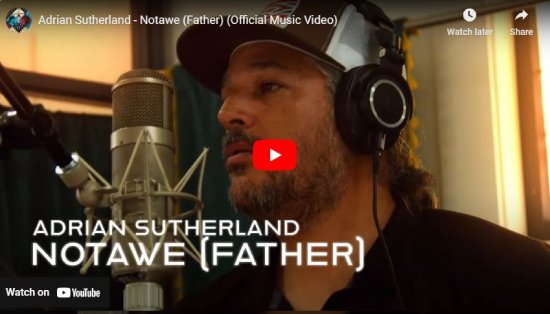The more things change, the more they stay the same. This idiom captures the life and times of Adrian Sutherland. Following a 2022 JUNO nomination for his solo debut, When The Magic Hits – which saw him realize some of his “big city dreams” – the singer-songwriter is still filled with gratitude. He’s still a proud Cree who hunts for food for his family. And his heart never strays far from home, in one of the most isolated places in Ontario – Attawapiskat First Nation, a fly-in community of 2,000 on James Bay. What’s changed are the demands on his time.
We catch up with the singer-songwriter in Toronto, meeting in a hotel lobby just down the road from Yonge-Dundas Square, where his image looms from a huge electronic billboard, in an ad for his sophomore solo record, Precious Diamonds.
The 46-year-old sports a jean jacket with Native American Made stitched on the arms. He was out of bed early that day for a live TV performance, appearing on Breakfast Television for the first time. Sutherland played “Notawe (Father)” [pronounced Noh-TUH-wee], the first single from Precious Diamonds. The song is a beautiful ode to all the fathers that have gone on to the spirit world. It’s one of two compositions on the new record sung in Sutherland’s native language of Omushkegowuk Cree. He says that singing the song on television “felt natural,” and “if I dropped a lyric, nobody noticed!”
People have been noticing the talented musician more and more in recent years. Even as his star rises, Sutherland balances this success, and touring life, with family, maintaining a traditional Cree lifestyle in Attawapiskat.
“You have to find the best of both worlds,” he says. “I have this Cree side to me, but I also live in this present world. It’s amazing that I can do both those things… I draw on my Indian side when I need to, and I always use that to guide me. I truly believe that side of me will always guide my decision-making, even with the music and business decisions.”
Sutherland is grateful for all that he’s accomplished – and admits that if he decided to leave the music industry behind to focus on family and other priorities, he’d have no regrets.
Precious Diamonds follows three albums Sutherland released as the frontperson and founder of all-Cree rockers Midnight Shine. Grammy-winning SOCAN member Colin Linden produced the new LP at his home studio in Nashville. This was the first time Sutherland came to Linden’s space; the pair worked on most of When the Magic Hits together, but did so remotely, during the pandemic. Speaking on the songs sung in Cree, Linden says, “You still feel the soul. Even before Adrian told me what the lyrics meant, I could feel them.”
Writing in Cree was important for Sutherland. “I had never before in my life written a complete song in Cree,” he says. “It’s odd, because I’m fluent in Cree, and English is my second language… I had a hard time with the phrasing and the delivery, because songs are different. It was uncomfortable at first. Only now am I feeling comfortable singing them.”
Why did he decide to write in his first language? “I started to think, ‘What makes me unique?’ and ‘What are some of the experiences that make me up that I can draw on for my next project?’ and realized that one of them is language,” says Sutherland. “I want to do my part as a Cree speaker to preserve the language for my children, and so it doesn’t die for future generations.” He even takes to social media weekly to share a new Cree word with followers.
Listening to Precious Diamonds is both a learning experience and an uplifting one. Songs tell stories that need to be told. Take “Boogeyman,” about the “evil holy man,” the scars left by the residential schools, and the ongoing reconciliation process. Sutherland sings in the chorus: They’re gonna come and try to steal my ways/ They’re gonna come and try to cut my braids / They’re gonna try to hide all those graves/ Like the old man used to say.
The goal of every song is the same for Sutherland. “It’s about trying to get to a better place, and leave listeners with an uplifting message,” he says. “Sure, some of the themes are emotional and heavy, like ‘Bogeyman,’ but it’s important to find a balance, and hopefully find a way, through the songs, to get to that better place.”
Other songs, like “The Storm,” and “You Are Left Behind,” are stories from his hometown. The latter is an ode to the mental health struggles faced by many in remote First Nations communities. Sutherland’s unique, first-hand perspective on life in Attawapiskat led to a book deal with Penguin Random House to share lessons learned, and shine a light on issues facing his community – housing, lack of drinking water, poverty, addiction.
“I immediately said yes to the opportunity, but I had no clue what I was getting myself into,” says Sutherland, who’s already written 100,000 draft words. “It’s definitely been a challenge, because it’s a whole different machine. As a songwriter, you’re so used to writing things short… saying things in such a condensed way. Writing a book, it’s the opposite. Everything you’re writing about, you have to make sure to describe it properly and in detail.”
As one of a few who’s found success beyond his community, Sutherland feels the weight he carries. He feels that telling the truth about his community, sharing its stories, and talking about the hard stuff, is essential to improve things in Indigenous communities, and preserve Indigenous cultures and traditions.
“It’s important to not lose your way of life,” he says. “Elder Russell Means… famously said, as we [Indigenous People] move into the urban world, we become less Indian, and we get further and further away from who we are.”

